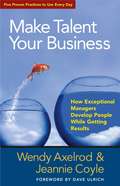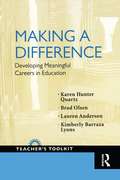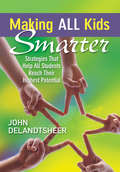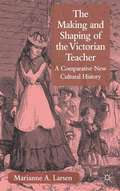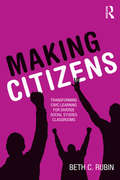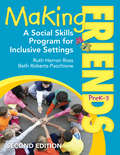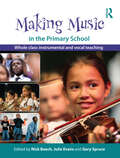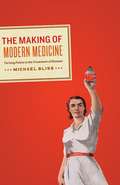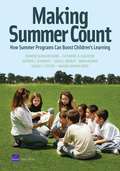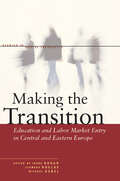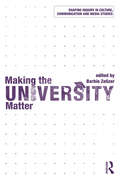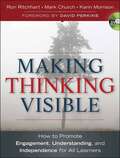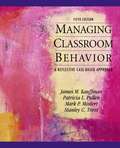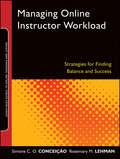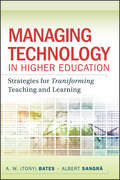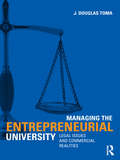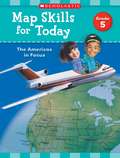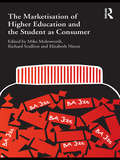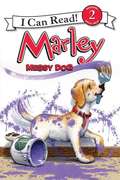- Table View
- List View
Make Meetings Work: Teach Yourself
by Karen ManneringMeetings are an inevitable and often unwelcome aspect of the working day. They figure heavily in all walks of life and create a forum for providing information, holding discussions, and making decisions. If they are run well they are a really valuable tool in running your organisation and progressing projects. If run badly they can seem like no more than a time-wasting irritant to the participants.Whether you hold meetings in your office or attend international summits, the meeting is a place where certain etiquette is essential. How to run a meeting, behave in a meeting, construct minutes, and Chair meetings are all essential skills for anyone wishing to move projects forward, forge a career in business or even run their own business. So, even if you are only a participant in frequent meetings this book will show you how to get the most out of them and ensure that they are a building block of success. From issuing invitations to taking the minutes, or even chairing a meeting, everything is covered.
Make Talent Your Business
by Jeannie Coyle Wendy AxelrodDespite considerable investment in resources and tools, many companies struggle to meet the demand for the talent they require. Make Talent Your Business\u201d gets to the heart of the matter: Managers themselves are in the best position to help people learn from experience (the uncontested major source of development) and shows managers how to do it by using the five practices that work for managers who are exceptional at building talent. This set of practices goes well beyond the usual managerial coaching and performance management. It moves the focus from performance today to development of skills that truly "raise the game" of employees--skills such as in-the-moment judgment, customer relationship building and collaborative decision-making. Managers who grow talent enhance their own reputations and get better results, retain people, attract talent and make their organizations more agile and capable to deal with future challenges.
Make Yourself Unforgettable: How to Become the Person Everyone Remembers and No One Can Resist (Dale Carnegie)
by Dale CarnegieFrom one of the most trusted and bestselling brands in business training, Make Yourself Unforgettable reveals how to develop and embody unforgettable qualities so you can become the effective and desirable colleague and friend possible.Learn how to develop and embody the ten essential elements of being unforgettable! What does it really mean to have class? How do you distinguish yourself from the crowd and become a successful leader? When should intuition guide your business decisions? The answers to these and other important questions can be found in this dynamic and inspiring guidebook for anyone looking to lead a life of greater meaning and influence. In Make Yourself Unforgettable you can learn the secrets to making a positive, lasting impression, including: · The six steps to managing communication problems · The four unexpected stumbling blocks to ethical behavior and how to avoid them · A new way to understand and exude confidence · Techniques for building resiliency and preventing fear · The five key social skills that identify someone as a class act Once you discover how you can naturally and effortlessly distinguish yourself, you’ll quickly find people in all areas of life responding to you more positively and generously than ever before.
Making a Difference: Developing Meaningful Careers in Education (Teacher's Toolkit Ser.)
by Brad Olsen Lauren Anderson Karen Hunter-Quartz Kimberly Barraza-LyonsOur culture and media often simplify the choice educators face-stay in or leave classroom teaching. Written for teachers and other educational professionals, this book dispels this simple dichotomy by representing the range of responses and career pathways that enable educators to make a difference. Based on interviews with hundreds of change-minded educators, the authors share career stories and insights against a backdrop that maps out the complexities, roles, and structures that define professional advancement in education. All of the teachers in this book have taught in challenging urban contexts, fought hard to exercise their professional autonomy and responsibility to serve students well, navigated social networks of educators, friends, and family who buoy or dampen their reform spirit, and remain committed to changing society through schooling. Their stories are as instructive as they are inspiring and offer roadmaps for the current generation of change-minded educators.
Making ALL Kids Smarter: Strategies That Help All Students Reach Their Highest Potential
by John P. DelandtsheerA hands-on guide for challenging ALL kids to think, create, and aspire! John DeLandtsheer brings 40 years of experience to this motivating resource that shows teachers how to raise the bar for all students. Included are strategies for differentiating instruction within the general classroom to challenge all learners with more rigorous content, showing teachers how to: Optimize learning by applying the six components of a brain-friendly classroom Build critical thinking skills with Socratic questioning and moral dilemmas Connect content through interdisciplinary themes Stimulate creativity with brainstorming activities Develop students’ research and study skills
The Making and Shaping of the Victorian Teacher
by Marianne A. LarsenProviding comparative and international contexts to understand the history of the making of the teacher in Victorian England, this is a compelling account of the development during this time of teacher training, inspections and certification - reforms which shaped the good teacher as a modern and moral individual.
Making Citizens: Transforming Civic Learning for Diverse Social Studies Classrooms
by Beth C. RubinCan social studies classrooms be effective "makers" of citizens if much of what occurs in these classrooms does little to prepare young people to participate in the civic and political life of our democracy? Making Citizens illustrates how social studies can recapture its civic purpose through an approach that incorporates meaningful civic learning into middle and high school classrooms. The book explains why social studies teachers, particularly those working in diverse and urban areas, should infuse civic education into their teaching, and outlines how this can be done effectively. Directed at both pre-service and in-service social studies teachers and designed for easy integration into social studies methods courses, this book follows students and teachers in social studies classrooms as they experience a new approach to the traditional, history-oriented social studies curriculum, using themes, essential questions, discussion, writing, current events and action research to explore enduring civic questions. Following the experiences of three teachers working at three diverse high schools, Beth C. Rubin considers how social studies classrooms might become places where young people study, ponder, discuss and write about relevant civic questions while they learn history. She draws upon the latest sociocultural theories on youth civic identity development to describe a field-tested approach to civic education that takes into consideration the classroom and curricular constraints faced by new teachers.
Making Friends, PreK–3: A Social Skills Program for Inclusive Settings (Second Edition)
by Ruth Herron Ross Elizabeth L. Roberts-PacchioneHelping students develop healthy social skills is child’s play <p><p> This newly retitled edition of the popular Wanna Play provides hundreds of fun and updated activities that help children learn how to behave appropriately and make friends. Ideal for teachers, counselors, and behavior therapists, included are tools for teaching emotion regulation, team-playing, and body safety to all children, making this resource an excellent fit for inclusive settings. New features include: <p> A social interaction checklist for identifying learners’ strengths and weaknesses <p> Teacher-friendly activities that can be used in small groups or with the whole class <p> A chapter on emotions
Making Music in the Primary School: Whole Class Instrumental and Vocal Teaching
by Nick Beach Julie Evans Gary SpruceMaking Music in the Primary School is an essential guide for all student and practising primary school teachers, instrumental teachers and community musicians involved in music with children. It explores teaching and learning music with the whole class and provides a framework for successful musical experiences with large groups of children. Striking the perfect balance between theory and practice, this invaluable text includes case studies and exemplars, carefully designed activities to try out in the classroom, as well as a range of tried-and-tested teaching strategies to help you support and develop children’s musical experience in the classroom. Grounded within a practical, philosophical and theoretical framework, the book is structured around the four key principles that underpin effective music teaching and experience: Integration – how can we join up children’s musical experiences? Creativity – how can we support children’s musical exploration? Access and Inclusion – how can we provide a relevant experience for every child? Collaboration – how might we work together to achieve these aims? Written in a clear, accessible and engaging style, Making Music in the Primary School will give you all the confidence you need when working with whole classes, whatever your musical or teaching background.
The Making of Modern Medicine: Turning Points in the Treatment of Disease
by Michael BlissAt the dawn of the twenty-first century, we have become accustomed to medical breakthroughs and conditioned to assume that, regardless of illnesses, doctors almost certainly will be able to help not just by diagnosing us and alleviating our pain, but by actually treating or even curing diseases, and significantly improving our lives. For most of human history, however, that was far from the case, as veteran medical historian Michael Bliss explains in "The Making of Modern Medicine. " Focusing on a few key moments in the transformation of medical care, Bliss reveals the way that new discoveries and new approaches led doctors and patients alike to discard fatalism and their traditional religious acceptance of suffering in favor of a new faith in health care and in the capacity of doctors to treat disease. He takes readers in his account to three turning points a devastating smallpox outbreak in Montreal in 1885, the founding of the Johns Hopkins Hospital and Medical School, and the discovery of insulin and recounts the lives of three crucial figures researcher Frederick Banting, surgeon Harvey Cushing, and physician William Osler turning medical history into a fascinating story of dedication and discovery. Compact and compelling, this searching historyvividly depicts and explains the emergence of modern medicine and, in a provocative epilogue, outlines the paradoxes and confusions underlying our contemporary understanding of disease, death, and life itself. "
Making Summer Count: How Summer Programs Can Boost Children's Learning
by Heather L. Schwartz Susan J. Bodilly Jennifer Sloan Mccombs Catherine H. Augustine Brian McinnisResearch has shown that students' skills and knowledge often deteriorate during the summer months, with low-income students facing the largest losses. School districts and summer programming providers can benefit from the lessons learned by other programs in terms of developing strategies to maximize program effectiveness and quality, student participation, and strategic partnerships and funding.
Making the Transition
by Irena Kogan Clemens Noelke Michael GebelAfter the breakdown of socialism in Central and Eastern Europe, the role of education systems in preparing students for the "real world" changed. Though young people were freed from coercive state institutions, the shift to capitalism made the transition from school to work much more precarious and increased inequality in early career outcomes. This volume provides the first large-scale analysis of the impact social transformation has had on young people in their transition from school to work in Central and Eastern European countries. Written by local experts, the book examines the process for those entering the workforce under socialism, during the turbulent transformation years, in the early 2000s, and today. It considers both the risks and opportunities that have emerged, and reveals how they are distributed across social groups. Only by studying these changes can we better understand the long-term impact of socialism and post-socialist transformation on the problems young people in this part of the world are facing today.
Making the University Matter (Shaping Inquiry in Culture, Communication and Media Studies)
by Barbie ZelizerMaking the University Matter investigates how academics situate themselves simultaneously in the university and the world and how doing so affects the viability of the university setting. The university stands at the intersection of two sets of interests, needing to be at one with the world while aspiring to stand apart from it. In an era that promises intensified political instability, growing administrative pressures, dwindling economic returns and questions about economic viability, lower enrolments and shrinking programs, can the university continue to matter into the future? And if so, in which way? What will help it survive as an honest broker? What are the mechanisms for ensuring its independent voice? Barbie Zelizer brings together some of the leading names in the field of media and communication studies from around the globe to consider a multiplicity of answers from across the curriculum on making the university matter, including critical scholarship, interdisciplinarity, curricular blends of the humanities and social sciences, practical training and policy work. The collection is introduced with an essay by the editor and each section has a brief introduction to contextualise the essays and highlight the issues they raise.
Making Thinking Visible: How to Promote Engagement, Understanding, and Independence for All Learners
by Ron Ritchhart Mark Church Karin MorrisonA proven program for enhancing students' thinking and comprehension abilities Visible Thinking is a research-based approach to teaching thinking, begun at Harvard's Project Zero, that develops students' thinking dispositions, while at the same time deepening their understanding of the topics they study. ? Rather than a set of fixed lessons, Visible Thinking is a varied collection of practices, including thinking routines?small sets of questions or a short sequence of steps?as well as the documentation of student thinking. ?Using this process thinking becomes visible as the students'?different viewpoints are expressed, documented, discussed and reflected upon. Helps direct student thinking and structure classroom discussion Can be applied with students at all grade levels and in all content areas Includes easy-to-implement classroom strategies The book also comes with a DVD of video clips featuring Visible Thinking in practice in different classrooms.
Managing Change: Bullet Guides
by Tina KonstantOpen this book and you will Overcome barriers Control costs Monitor progress Get results
Managing Change: Bullet Guides
by Tina KonstantOpen this book and you will Overcome barriers Control costs Monitor progress Get results
Managing Classroom Behaviors: A Reflective Case-based Approach
by James M. Kauffman Patricia L. Pullen Mark P. Mostert Stanley C. TrentManaging Classroom Behavioris written for elementary, middle, and high school teachers, both generalandspecial educators, who are currently in training or already teaching in the classroom. Based entirely on empirical research and richly illustrated with numerous examples on how behavior is managed in the classroom, this popular case book is widely used in the education community. Giving its readers a real-world look at the subject, it provides the opportunity for teachers to practice applying principles of behavior management through the analysis of actual case studies, self-questioning, and reflection. All case studies are included-in full- in Part II of the text and portray teachers' actual experiences and opportunity for application by the reader. Widely diverse, the cases depict general and special educator, and describe students ranging from primary grades to high school. There are also multicultural cases and a discussion of multicultural issues. This updated edition features a new chapter on planning for the school year and managing the physical environment; a new special feature which makes direct and explicit links between chapters in Part I and specific cases in Part II; revised and updated case studies, with the inclusion ofallcase descriptions now in the text; reorganized inclusion of APA references and the APA Style Guide; and all chapters have gone through a thorough revision process.
Managing Online Instructor Workload
by Rosemary M. Lehman Simone C.O. ConceiçãoA large number of institutions are now providing online programs, requiring instructors to change the way they think about teaching and master a distinct set of workload management skills. The first book to discuss workload management for online instructors, Managing Online Instructor Workload offers practical strategies, advice, and examples for how to prioritize, balance, and manage an online teaching workload. Based on surveys and interviews, the timely and comprehensive insight in this book is essential for online instructors, instructional designers, faculty developers and others involved in online learning.
Managing Technology in Higher Education
by A. W. Bates Albert SangraUniversities continue to struggle in their efforts to fully integrate information and communications technology within their activities. Based on examination of current practices in technology integration at 25 universities worldwide, this book argues for a radical approach to the management of technology in higher education. It offers recommendations for improving governance, strategic planning, integration of administrative and teaching services, management of digital resources, and training of technology managers and administrators. The book is written for anyone wanting to ensure technology is integrated as effectively and efficiently as possible.
Managing the Entrepreneurial University: Legal Issues and Commercial Realities
by J. Douglas TomaManaging the Entrepreneurial University is essential reading for both higher education administrators and those studying to enter the field. As universities have become more market focused, they have changed dramatically. But has the law kept up? This book explains fundamental legal concepts in clear, non-technical language and grounds them in practical management situations, indicating where doctrines and standards have evolved, identifying where legal difficulties may be more likely to arise, and suggesting where change may be merited. In its chapters on process, discrimination, employment, students, and regulation, the book: Provides lively case studies applicable to every type of institution Includes a simulation exercise at the end of each chapter for use in teaching or training Draws on an over 550-source bibliography A hypothetical case spans each chapter, addressing not only research universities and elite liberal arts colleges, but also community colleges, small private colleges, and regional comprehensive universities. Readers working across functional areas and at various institution types will find the book directly relevant in clarifying and deepening their understanding of the legal environment associated with their responsibilities within the entrepreneurial university.
Map Skills For Today: Grade 5 (Map Skills For Today Ser.)
by Staff Scholastic IncWhy are there different time zones and how does Earth's rotation affect the seasons? These questions and others are answered in this activity book that helps students develop a rich understanding of the world's geography by looking at projection maps, political maps, and time zones. It also features specialty maps showing historic highways, early U.S. settlements, and transportation routes. Includes maps of Canada and our neighbors to the south!
The Mario Garcia Omnibus E-book
by Mario T. GarcíaThis Omnibus E-Book brings together Mario Garcia's landmark books on Latino Studies. The Latino Generation: Voices of the New AmericaLatinos are already the largest minority group in the United States, and experts estimate that by 2050, one out of three Americans will identify themselves as Latino. Though their population and influence are steadily rising, stereotypes and misconceptions about Latinos remain, from the assumption that they refuse to learn English to questions of just how "American" they actually are. By presenting thirteen riveting oral histories of young, first-generation college students, Mario T. Garcia counters those long-held stereotypes and expands our understanding of what he terms "the Latino Generation."Blowout!: Sal Castro and the Chicano Struggle for Educational JusticeThis fascinating oral history transcribed and presented in Castro's voice by historian Mario T. Garcia, is a compelling, highly readable narrative of Castro, a young boy growing up in Los Angeles who made history by his leadership in the blowouts and in his career as a dedicated and committed teacher.
Marketing Intelligent Design
by Frank S. RavitchRecently a new battle has emerged between science and religion. The battle has focused on intelligent design (ID) and the numerous legal, philosophical, and educational concerns surrounding it. Resolution of these concerns centers on two questions: Is ID science? And is ID religion? Despite the fact that ID does not meet the standards of scientific rigor, ID proponents have been able to create a remarkably well-designed marketing plan aimed at imposing a theistic naturalism in schools and scientific discourse. Both the ID movement and some of its most vociferous opponents have a vested interest in suggesting that science, especially evolutionary biology, and religion are incompatible. This book presents a philosophical and legal counterpoint by demonstrating the compatibility between religion and evolutionary biology and the incompatibility between ID and mainstream science.
The Marketisation of Higher Education and the Student as Consumer
by Mike MolesworthUntil recently government policy in the UK has encouraged an expansion of Higher Education to increase participation and with an express aim of creating a more educated workforce. This expansion has led to competition between Higher Education institutions, with students increasingly positioned as consumers and institutions working to improve the extent to which they meet ‘consumer demands’. Especially given the latest government funding cuts, the most prevalent outlook in Higher Education today is one of business, forcing institutions to reassess the way they are managed and promoted to ensure maximum efficiency, sales and ‘profits’. Students view the opportunity to gain a degree as a right, and a service which they have paid for, demanding a greater choice and a return on their investment. Changes in higher education have been rapid, and there has been little critical research into the implications. This volume brings together internationally comparative academic perspectives, critical accounts and empirical research to explore fully the issues and experiences of education as a commodity, examining: the international and financial context of marketisation the new purposes of universities the implications of university branding and promotion league tables and student surveys vs. quality of education the higher education market and distance learning students as ‘active consumers’ in the co-creation of value changing student experiences, demands and focus. With contributions from many of the leading names involved in Higher Education including Ron Barnett, Frank Furedi, Lewis Elton, Roger Brown and also Laurie Taylor in his journalistic guise as an academic at the University of Poppleton, this book will be essential reading for many.
Marley: Messy Dog (I Can Read! #Level 2)
by Susan HillWhen Mommy decides to surprise Cassie with a newly painted bedroom, Marley wants to help. But by the time he's done, the messy dog is in need of a little help himself.

